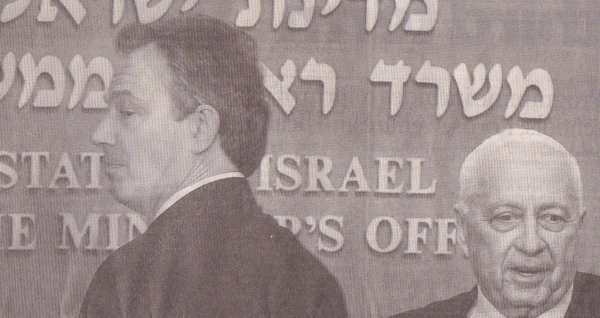
january 2005
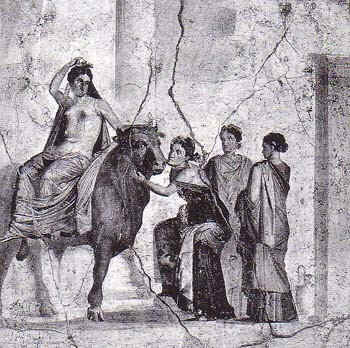 EUROPEAN UNION NEWS
EUROPEAN UNION NEWS
Rachid Taha:speaking of his
album "Tékitoi" and about the
frustrations of Arabic youths, the war in Iraq, and
crisis in the Arabic world.
Mr Taha, your new album "Tékitoi" sounds
like rock, it is very angry. Why?
 I wanted to banish my
nightmares. Not a single day goes by without a murder
taking place. Not a day goes by without the Arabic
culture being brought into connection with one news story
or another about terror, in the radio or on television.
These representations are often exaggerated to the point
of becoming caricatures.
I wanted to banish my
nightmares. Not a single day goes by without a murder
taking place. Not a day goes by without the Arabic
culture being brought into connection with one news story
or another about terror, in the radio or on television.
These representations are often exaggerated to the point
of becoming caricatures.
With this album I was aiming to create a weapon of mass
destruction that destroys prejudices. This is about
people who are no different from us, we who live in
Western Europe. This album is an attempt to fight the
schizophrenia the Occident has in relation to the Arabic
world.
Pete Townshend once said that The Who need a heavy
weapon, namely loud noise, to yank the audience out of
its lethargy. That’s what it’s about. I share
this opinion, and I am a big fan of The Who.
What the Americans are bringing to Iraq is a model that
is diametrically opposed to democracy. With the result
that especially the young people will end up always
rejecting democracy because they are certain they
don’t want whatever is brought into the country with
bombs and terror. The US’s war is creating a new
generation that has learned first and foremost hatred.
There is definitely a tendency among young people to cut
themselves off from society. This is because, among other
things, Arabic immigrants and their children who were
born in France were almost completely ignored for a long
time—they were not integrated into the working
world, and their music and culture were not exactly
welcomed with open arms.
You were once considered a speaker for the children of
immigrants, the generation that has grown up in France.
Do you have the feeling that you can still reach the
younger generations?
No, I can’t anymore. The grass has been cut from
right under our feet. The base has been destroyed with
whom we could have had a dialog. You have to say that for
a long time the politics were all wrong. In particular
the Socialist Party in France made big mistakes in their
interaction with immigrants, mistakes that contributed to
the fact that the social bond has been broken.
Detaining
foreign terrorism suspects without trial breaks human
rights laws, the UK's highest court has
ruled.
Terror detainees win Lords appeal
In a blow to the government's
anti-terror measures, the House of Lords law lords ruled
by an eight to one majority in favour of appeals by nine
detainees.

Most of the men are being indefinitely held in Belmarsh prison, south London.
The law lords said the measures
were incompatible with European human rights laws.
The men will stay behind bars while ministers decide how
to react. Belmarsh prison has been dubbed Britain's
Guantanamo Bay by civil rights campaigners opposed to the
use of emergency anti-terror laws. The detainees took
their case to the House of Lords after the Court of
Appeal backed the Home Office's powers to hold them
without limit or charge.
Constitutional importance
The government opted out of
part of the European Convention on Human Rights
concerning the right to a fair trial in order to bring in
anti-terrorism legislation in response to the 11
September attacks in the US.
Any foreign national suspected of links with terrorism
can be detained or can opt to be deported. However those
detained cannot be deported if this would mean
persecution in their homeland.
On Thursday, senior law lord Lord Bingham said the rules were incompatible with the European Convention on Human Rights as they allowed "detention of suspected international terrorists in a way that discriminates on the ground of nationality or immigration status". Lord Nicholls of Birkenhead, in his ruling, said: "Indefinite imprisonment without charge or trial is anathema in any country which observes the rule of law. "It deprives the detained person of the protection a criminal trial is intended to afford." He said the main problem for the government's case was that it was trying to justify detention without trial for foreign suspects while using lesser steps for British citizens accused of being international terrorists.
The case was heard by a panel of nine Law Lords rather than the usual five because of the constitutional importance of the legal challenge.
Ben Emmerson QC, representing seven of the detainees, said the men had already been in custody for nearly three years on the grounds that they might be supporters of international terrorism. He said they had been given no idea when, if ever, they would be released, had never been formally interviewed and there was no prospect they would ever be put on trial.
When the men were first held, they took their cases to the Special Immigration Appeals Commission (SIAC). The commission ruled on 30 July, 2002 that the anti-terror act unjustifiably discriminated against foreign nationals as British people could be held in the same way. The Home Office went to the Court of Appeal which overturned the SIAC ruling in October 2002. The court said the legislation was not in breach of the European Convention and opting out was necessary because there was a state of emergency threatening the life of the nation.
BLAIR TALKS ABOUT HIS
INVASION OF IRAQ, AND THE COLONIAL FUTURE:
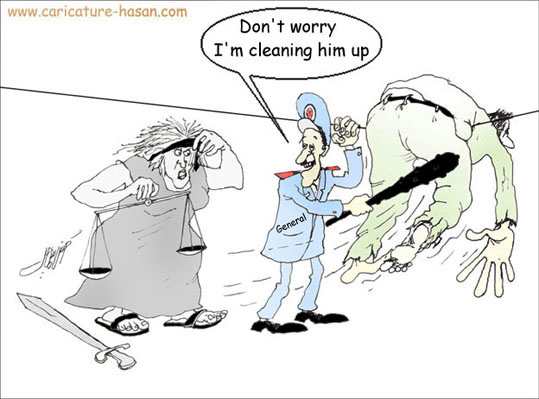
During his surprise visit, Blair held talks with Allawi and Iraqi election officials, whom he called heroes for carrying out their work despite attacks by insurgents. Three members of Iraq's election commission were dragged from the car and killed this week in Baghdad. "I said to them that I thought they were the heroes of the new Iraq that's being created, because here are people who are risking their lives every day to make sure that the people of Iraq get a chance to decide their own destiny," Blair said during a joint news conference with Allawi.
Blair, who has paid a political price for
going to war in Iraq, defended the role of Britain's
8,000 troops by referring to terrorism.....
Freed French hostages
arrive home
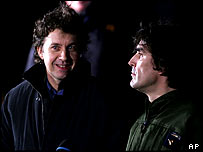 Two French reporters who were released after
being held hostage for four months at the hands of Iraqi
militants have arrived home to a hero's welcome.
Two French reporters who were released after
being held hostage for four months at the hands of Iraqi
militants have arrived home to a hero's welcome.
Georges Malbrunot and Christian Chesnot arrived in Paris to be greeted by President Jacques Chirac, who cut short his holiday in Morocco to be there. "We're fine, we lived through a difficult experience," said Mr Malbrunot, a reporter for Le Figaro.
He said the two reporters had not been mistreated by their captors. He said they had been in or around Baghdad most of the time, even though they had often been moved between various locations. And they had never lost their hope of being released. The men's captors said they were freed because of France's anti-war stance.
Mr Chesnot, 37, and Mr Malbrunot, 41, arrived at the Villacoublay military airbase near Paris, after flying from Baghdad via Cyprus, where they were joined by French Foreign Minister Michel Barnier. Looking emotional, but in good health, they had long embraces with family members before meeting President Chirac, and the French prime minister and defence minister.
The Paris metro interrupted its usual warnings to passengers of train delays and pickpockets with a special announcement, the AFP news agency reported. The journalists' supporters went round French cities pasting the word "Free" to posters put up to remind the country of the hostages' plight.
They were abducted while driving to the city of Najaf with their Syrian driver, Mohammed al-Jundi, who was later found during the US-led assault on Falluja. The journalists' captors - the Islamic Army in Iraq (IAI) - initially demanded that France scrap a law banning Muslim headscarves from being worn in schools - a demand shunned by France.
IN ENGLAND
mobile phone masts can NOW be built right next to schools
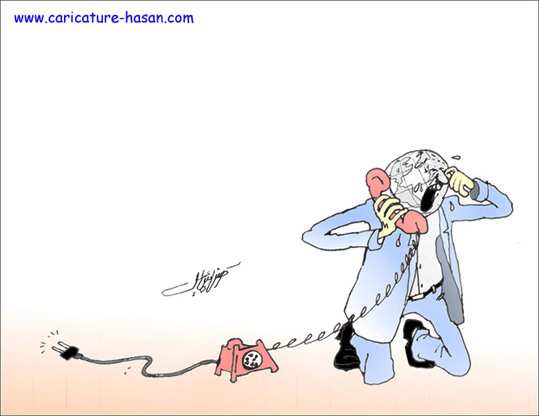
Ministers give in to legal ruling that health concerns
should not prevent rapid rise in the number of
transmitters
By Geoffrey Lean, Environment Correspondent
19 December 2004
Ministers have accepted that mobile phone masts can be
built next to schools, in defiance of the recommendations
of an official inquiry. The decision is expected to lead
to an "explosion" of the masts at schools
around the country. In a crucial test case, the Deputy
Prime Minister, John Prescott, has decided not to contest
a judgment that risks to children's health cannot
normally be taken into account in establishing where a
mast is to be sited.
As reported in last week's Independent on Sunday, at
least 8,000 new masts are to be erected around Britain
over the next three years as the new 3G
telecommunications system expands. Under exceptionally
lax government rules, almost all of them can be erected
without the need for formal planning permission, waiving
normal democratic scrutiny. Mr Prescott's decision makes
the position even worse. It means that even when masts do
go through the proper planning process, only aesthetic
issues such as their intrusion on the landscape can
considered: the health risks, which worry most objectors,
will be ignored.
There is increasing scientific concern that radiation
from mobile phones damages the brain. Masts generally
cause less disquiet, as people do not normally stand
close to them. Protesters point out, however, that those
living or working nearby are exposed, involuntarily, for
long periods. Children are more vulnerable than adults as
their skulls are thinner and their immune systems less
well developed.
The test case centres around a mast that three mobile
phone companies are to build within 400 yards of
Woodfield Community Primary School, St Robert's Primary,
and Granby High School in Harrogate.
Radiation from the mast will be at the highest at the
primary schools, as the "beam of maximum
intensity" from the mast would fall on them. Four
years ago, a government inquiry, headed by Sir William
Stewart - a former Government chief scientist -
recommended that in such cases, masts should not be
erected unless the school and parents agreed. A year ago
- after protests from parents - Harrogate council refused
to give the mast planning permission on health grounds.
The companies appealed, but a public inquiry upheld the
council's refusal because there was "insufficient
reassurance" that the mast would cause "no
material harm to the children's health". The
companies then took the case to court. Mr Prescott
supported the council, but the judge decided in favour of
the phone companies. It was then the Deputy Prime
Minister's turn to appeal, but last month the Court of
Appeal also gave the mast the go-ahead, saying the
planning process should only be allowed to consider
"perceived health risks" in exceptional
circumstances.
Protesters and MPs will be urging him to amend his
planning guidance to councils, which fatally undermines
his case by stipulating that permission to erect masts
cannot be refused on health grounds. Dr Peter Brooks,
whose two daughters attend St Robert's in Harrogate, says
the school lies directly in the transmission path of the
proposed mast. Dr Brooks, a lecturer in engineering at
Leeds University, is concerned that important technical
data about the dangers were not presented to the Court of
Appeal: "The public should have a say in what
happens in their own communities. I don't feel our voice
has been heard," he said. His wife, Paula, said:
"Until the safety of masts is known we'd like the
Government to err on the side of caution. We would have
loved the Government to appeal the decision. My husband
was at the appeal hearing and felt that the Government
didn't really fight. It was as if they wanted [the phone
companies] to win. "There has been tremendous
support from our school but the school doesn't own the
land. The land sits on council land. The education
authority has been unhelpful. We felt very saddened by
that."
Mr Willis, Liberal Democrat MP for Harrogate and
Knaresborough, said that the Government, having received
£22.5bn for their 3G licences, was "terrified"
of the court cases that the companies might bring against
it if their ability to erect the masts was brought under
greater control.
19 December 2004 16:26
Raiders have stolen millions of pounds in cash from a bank in Belfast...and a pinch of salt.
The precise amount of money taken from the Northern Bank is not yet known but the bank said it was "significant". It is understood two employees of the bank and their families were held captive before the robbery took place. It happened at the bank's headquarters in Donegall Square West in the city.
It is believed it could be one of the biggest cash robberies in the UK. No figure has been put on the amount stolen, but speculation has varied from between £20m and £30m. Police were first alerted to the robbery at about 2345 GMT on Monday. It is believed members of the gang took over the homes of senior officials from the bank. The building houses the bank's cash centre, where tens of millions of pounds are believed to have been stored.
Call on the German
Federal Prosecutor to Investigate Rumsfeld and Other U.S.
Officials for War Crimes at Abu Ghraib
The Center for Constitutional Rights (CCR), in reference to four Iraqis who were tortured in U.S. custody, filed a complaint on November 30, 2004, with the German Federal Prosecutor's Office against high ranking United States civilian and military commanders over the abuses at Abu Ghraib prison and elsewhere in Iraq. Please join our effort! The German Prosecutor's Office has discretion to decide whether to initiate an investigation and may come to a decision as early as January. It is critical that they hear from you and understand that people around the world support this effort. Send a letter here.
We are asking the German prosecutor to launch an investigation: since the U.S. government is unwilling to open an independent investigation into the responsibility of these officials for war crimes, and since the U.S. has refused to join the International Criminal Court, CCR and the Iraqi victims have brought this complaint in Germany as a court of last resort. Several of the defendants are stationed in Germany. Defendants include Secretary of Defense Donald H. Rumsfeld, former CIA Director George Tenet, Lt. General Ricardo S. Sanchez, Major-General Walter Wojdakowski, Brig.-General Janis Karpinski, Lt.-Colonel Jerry L. Phillabaum, Colonel Thomas M. Pappas, Lt.-Colonel Stephen L. Jordan, Major-General Geoffrey Miller, and Undersecretary of Defense for Intelligence Stephen Cambone.
German law allows German courts to prosecute for killing, torture, cruel and inhumane treatment, forcible transfers and sexual coercion such as occurred at Abu Ghraib. The world has seen the photographs and read the leaked "torture memos" - we are doing what is necessary when other systems of justice have failed and seeking to hold officials up the chain of command responsible for the shameful abuses that occurred.
(If the above link doesn't work, paste
this address into your browser:
http://www.ccr-ny.org/v2/whatsnew/action/actionAlert2.asp
For more information on the suit, go to www.ccr-ny.org.)
Please forward this message widely!
Sincerely,
Michael Ratner
President
Center for Constitutional Rights
Peter Weiss
Vice-President
Center for Constitutional Rights
UPDATE:
Lawsuit against Rumsfeld Threatens
U.S.-German Relations
Deutsche Welle Tuesday 14 December
2004
The Pentagon made thinly veiled threats on Monday, suggesting US-German relations could be at risk if a criminal complaint filed in German courts over Abu Ghraib proceeds.
The Pentagon expressed concern Monday over a criminal complaint filed in Germany against US Defense Secretary Donald Rumsfeld and other officials over the Abu Ghraib prison scandal, warning that "frivolous lawsuits" could affect the broader US-German relationship."Generally speaking, as is true anywhere, if these kinds of lawsuits take place with American servicemen in the cross-hairs, you bet it's something we take seriously," said Lawrence DiRita, the Pentagon's spokesman. "If you get an adventurous prosecutor who might want to seize onto one of these frivolous lawsuits, it could affect the broader relationship. I think that's probably safe to say," he told AFP.
Germany is home to some 70,000 US troops, many of which have rotated into and out of Iraq from German bases. Sanchez, the former US commander in Iraq, is stationed in Germany as commander of the Army's 5th Corps.
The groups that filed the complaint said they had chosen Germany because of its Code of Crimes Against International Law, introduced in 2002, which grants German courts universal jurisdiction in cases involving war crimes or crimes against humanity. It also makes military or civilian commanders who fail to prevent their subordinates from committing such acts liable. DiRita said he did not know whether the United States had raised specific concerns directly with the German government. But he said, "I think every government in the world, particularly a NATO ally, understands the potential effect on relations with the United States if these kinds of frivolous lawsuits were ever to see the light of day."
- Is Holocaust Revisionism Illegal?
- In the United States, it is covered by the First Amendment, like every peaceful, scholarly speech, which means that it is perfectly legal to voice, write, publish revisionist views. Things are quite different, however, when we turn to Canada, Australia, or even several countries in Europe.
- In Australia and Canada, everything that is offending to the Jewish community will be prosecuted by their so-called "Human Rights Commission", a body which exists parallelly to the legal system and which can order the confiscation of publications, the payment of fines, and the forced declaration of apologies by the 'perpetrators.' Though these commissions are not part of the regular legal system, disobeying them would by itself be a crime which in turn would lead to criminal charges by the legal systems of Canada and Australia. Although Holocaust Revisionism does not address anything about Jews per se, all Jewish communities feel heavily offended by it, because Revisionism directly or indirectly comes to the conclusion that several Jewish personalities were not always truthful when testifying about their experiences in World War II. Of course, it would be surprising if Jews were to be the only identifiable group of humans who never lie, distort, and exaggerate, but apparently leading Jewish representative feel that nobody should ever be allowed to claim that certain Jews were dishonest about the Holocaust.
- In several European countries, Holocaust Revisionism is considered to be a serious crime. In France, people can be sent to jail for up the a year; in Switzerland up to three years; in Germany--as in Israel--for five years; in Austria, a prison term up to 10 years is possible.
- However, if we look into the legal
situation, we must insist that theoretically,
Holocaust Revisionism should be perfectly legal
in all these countries. This is so because all
these nations signed the United Nations
Declaration of Human Rights, which makes these
Human Rights binding on all these nations.
Freedom of speech can be limited only in cases of
insult or incitement to criminal acts, but
freedom of scientific research and peaceful
speech can never be limited--theoretically. For
this reason, a recent comprehensive German
doctoral dissertation on the "Punishment of
the Auschwitz Lie" (Die Strafbarkeit des
Auschwitz-Leugnens) came to the conclusion that
Holocaust Revisionism itself can not be legally
repressed: it would violate basic human rights.
From Ingrid Rimland
irimland@mail.bellsouth.ne
wATCH YOUR BACK tONY !!
